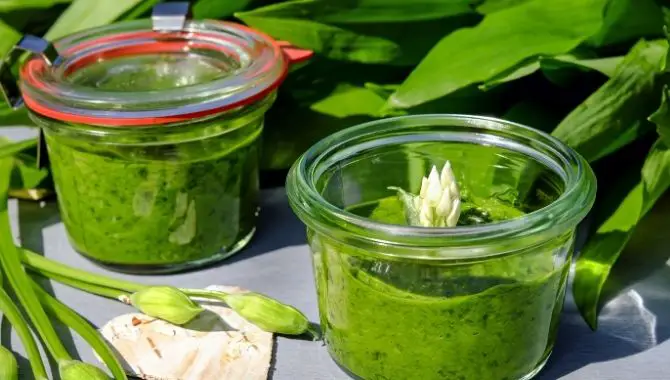A popular Italian staple, pesto turns any plain pasta into a quick, delicious meal. When you go vegan, you might fear that this tasty sauce is now off-limits: although the flavour comes largely from basil, the presence of parmesan cheese or similar dairy ingredients make most pesto sauces non-vegan.
While conventional pesto recipes aren’t vegan, however, there are some tasty vegan versions of pesto that you can safely add to your cruelty-free dishes.
Is pesto vegan? The answer for most commercial pesto sauces would be “no.” Standard pesto recipes include cheese. Many manufacturers use other animal ingredients too, like whey or meat-based flavourings. Pesto sauce can be made vegan by omitting these ingredients.
You’ve reached this page because you want to know whether pesto sauce is safe for a vegan diet. Can vegans eat pesto? Is pesto made with animal ingredients? What ingredients does pesto sauce contain, and which ones do vegans need to be concerned about? Are there any brands of vegan pesto sauce? Can you make your own vegan pesto? Read on to find out more about pesto and how you can incorporate it into your healthy vegan diet. We have the answers you’re looking for.
Read Also: Substitute for nutritional yeast
Is Pesto Vegan?
If you look at any jar of pesto on the supermarket shelves, you won’t have to read very far before you see an animal derivative. Most pesto sauces contain some form of cheese, or at least whey. Some might have other animal derivatives too, like eggs, meat stock or similar flavourings. In short, most pesto isn’t vegan.
Fortunately for lovers of Italian food, that’s not the end of the story. Let’s take a look at what makes pesto so yummy and versatile.
The classic green pesto is made with fresh basil, garlic, olive oil, pine nuts, and parmesan or a similar cheese. Of these, the only ingredient of animal origin is the parmesan cheese. Cheese is not crucial to the flavour — there are plenty of other ingredients that can be substituted.
That wonderfully fresh flavour you probably associate with pesto sauce comes from the basil. Since it’s a herb, basil is naturally vegan and cruelty-free, although you might want to be extra careful and ensure you only choose sauces made with organic basil. You can certainly make pesto with other fresh herbs, if you wish, but basil is the canonical base for a tasty pesto verde.
Next there’s garlic, without which an Italian dish just isn’t Italian. Similarly, garlic is a vegetable and completely safe for a vegan diet. It’s also tremendously healthy: garlic is traditionally used to fight off infections and keep your heart in good shape.
Then there’s the pine nuts. Pine nuts aren’t really nuts — they’re the edible seeds of pines, produced by about 20 species of pine tree. These, too, are safely vegan. You can use pine nuts in the place of cheese, including parmesan.
Pine nuts are great for a vegan diet as they are packed with flavour and full of protein. Pine nuts have lots of healthy fats and work well in many recipes. As long as you get them from a sustainable source, they’re completely vegan and okay for even the strictest diets. Pine nuts are often safe for people who can’t eat tree nuts.
Olive oil is a bit more complicated than you might assume from a vegan perspective. True, it’s completely vegetable in origin, which makes it acceptable to many vegans. If your vegan diet is more strict, though, olive oil might be a bit dubious. Olive farming can be quite water-intensive and the process of extracting the oil produces a lot of waste. The chemical fertilizers used by some olive farmers can be a concern, too.
Whether or not you consider olive oil to be vegan will depend to a degree on your motives for veganism. If you’re a vegan out of concern for animal suffering, olive oil might be acceptable: it doesn’t involve any animals or animal by-products. If you’re a vegan due to your environmentalism, then the environmental impact of most commercial olive oil production might put it off-limits. There’s no reason that pesto has to be made with olive oil, of course. Any healthy, cruelty-free vegetable or seed-based oil will work just fine.
So pesto could be vegan?
Yes, that’s right. If you omit the parmesan and any other dubious ingredients, pesto sauce can work with even the strictest vegan diets. While most standard ready-made pesto sauces aren’t vegan, you can certainly find brands that are. There are plenty of tasty, cruelty-free readymade pesto sauces on the shelves, in a range of flavours.
Finding vegan pesto in your local supermarket might be a little hit-and-miss, although larger stores now carry a lot more vegan food than they used to. You can also order online. If you’re very lucky, you might live near a delicatessen that sells fresh vegan pesto made onsite: there really isn’t anything better.
Be aware that even if they don’t contain ingredients you want to avoid, some commercial pesto sauces are made by companies that are ethically dubious. Do your homework before you buy.
Another option is to make your own pesto. This really doesn’t take long and is very simple — a classic pesto only has four or five ingredients, after all, and requires no cooking. You just drop your ingredients into a blender and give them a spin.
What are some good vegan pesto brands?
If you’re looking for a really classic pesto flavour, try Biona Organic green pesto. This is made with pine nuts and is completely vegan. It does use olive oil but the ingredients are all organic.
Another good basic green pesto is Le Conserve Della Nonna Classic Green Pesto. It’s a bit more expensive but it’s one of the closest to that classic basil-and-pine-nut flavour. As well as being vegan it contains no soy, gluten or tree nuts.
Again on the expensive side, Roza’s Gourmet Dairy-Free pesto is all-natural and delicious. It’s made with no gluten and has a very distinctive basil flavour. Roza’s is made in Australia but you can often pick it up in vegetarian, vegan and wholefoods stores.
Sacla, one of the major Italian sauce brands in the UK, produces a nice vegan pesto. They include silken tofu to give it texture; the result is very tasty and similar to regular pesto.
Suma does a very nice organic vegan green pesto. It’s a little less flavourful than some of the luxury options but makes for a great store-cupboard staple.
Vegan pesto recipes
If you choose to go home-made, you have even more options. The great thing about making your own pesto is that you have total control over the ingredients.
A basic pesto verde is ridiculously simple. Basil, pine nuts, oil and garlic — that’s it. You can tweak the texture and flavour with additional ingredients; I like a dash of lemon juice in mine and usually add a little nutritional yeast. For a “creamy” pesto I throw half a block of silken tofu in the blender and whizz it till it’s smooth. Here’s a basic recipe that you can tweak to suit your palate and needs.
2 packed cups of fresh basil (this needs to be fresh, as dried simply doesn’t work. Take out any large stems)
3 tablespoons of pine nuts; you can substitute your preferred tree nut, or sunflower seeds if you prefer.
2-3 large garlic cloves, peeled
2-3 teaspoons of organic extra virgin olive oil (or your preferred oil)
3-4 tablespoons of water (more if you like).
Optional ingredients:
A dash of lemon or lime juice
A pinch of sea salt
4 tablespoons of nutritional yeast (nooch gives your pesto a cheesy flavour but it can change the texture. If it’s too dry, add a little more water).
Place the ingredients except the oil and water in a blender. Mix it on high until you get a loose paste. Drizzle the olive oil in a little at a time. If it’s too thick, add water until you get the consistency you want.
You can swap the basil for other herbs — rocket pesto is nice — or add dried tomatoes for red pesto.
Your pesto will keep in the fridge for a week in the fridge, or you can freeze it in an ice-cube tray for a month. Buon appetito!
Welcome to VeganClue - My name is Robert Van De Ville and together with my team we spent hundreds of hours researching the most relevant topics for Vegans and non yet Vegans. Are you looking for more information about Veganism, animal welfare, diet, health, and environmental benefits of the Vegan lifestyle? You are in the right place! Enjoy the site.


